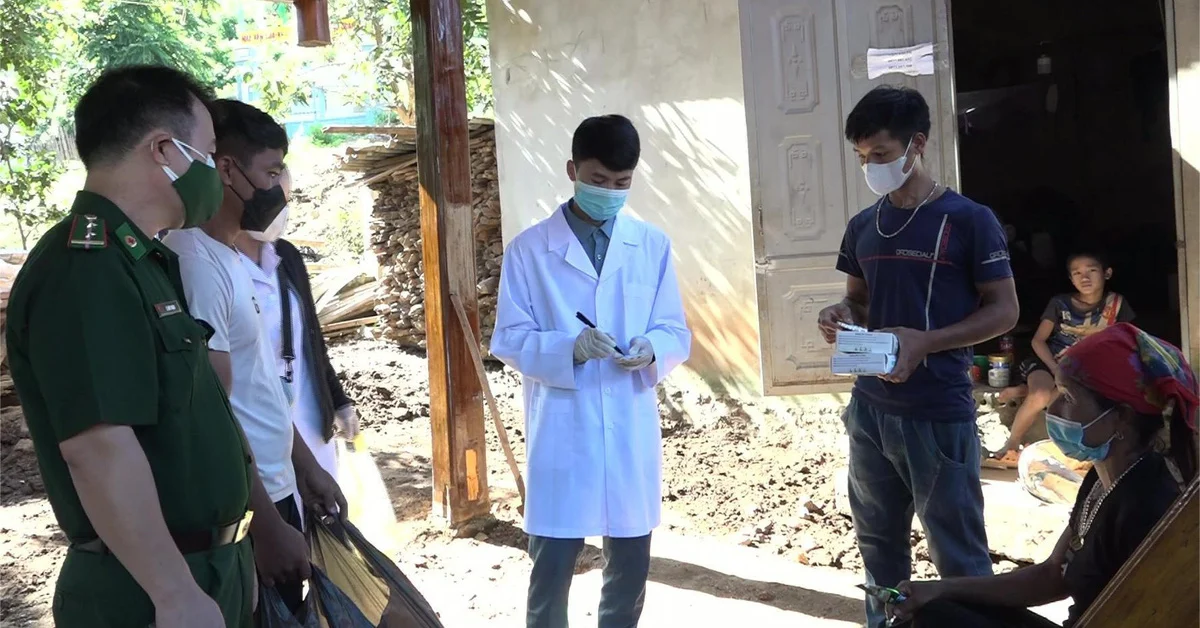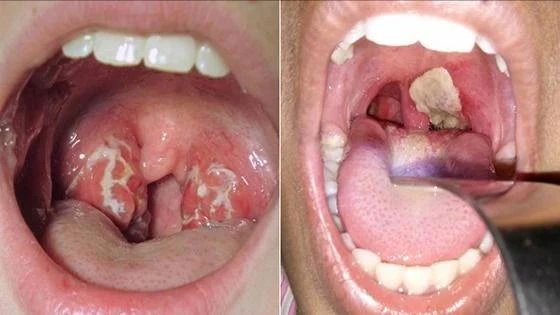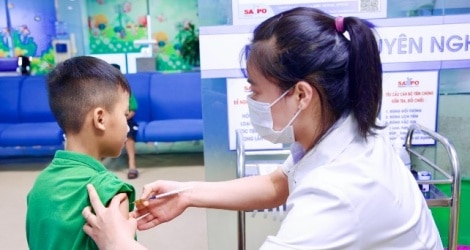Diphtheria is on the rise, experts say, due to gaps in vaccination.
In Pha Khao village, Pha Danh commune, Ky Son district, Nghe An province, a death due to diphtheria has just been recorded; this is the first case in this locality in many years.
 |
| Diphtheria is on the rise, experts say, due to gaps in vaccination. |
Along with that, in Hiep Hoa district, Bac Giang province also recorded 1 case of the disease due to close contact with the death case in Nghe An.
In the face of diphtheria cases spreading in the community after a period of no recorded outbreaks, people are worried about the risk of spreading diphtheria, a disease that is difficult to detect and can easily cause death.
Previously, at the end of 2023, diphtheria outbreaks reappeared in Ha Giang, Dien Bien, and Thai Nguyen provinces with dozens of cases.
Explaining why Vietnam has recently recorded sporadic diphtheria outbreaks after a long period of infrequent occurrence, experts say that diphtheria still has pathogens in the community, but in previous years, the vaccination rate was high, even in mountainous areas.
However, in recent years, especially during the Covid-19 pandemic, the shortage of vaccines has caused the rate to decrease, and people have not been able to get vaccinated during the pandemic.
In particular, recently, many families have neglected to vaccinate their children, and there is even a tendency not to vaccinate their children; therefore, the spread of pathogens will easily break out. Therefore, there have been outbreaks like the recent one, scattered in many localities.
Regarding the recent diphtheria outbreaks often occurring in mountainous areas, it is said that mountainous areas often have low vaccination rates, especially in remote areas with difficult travel.
Even the cold chain to preserve vaccines delivered to the site is difficult; meanwhile, people working in the fields and mountains also have difficulty accessing healthcare, and vaccination coverage in these areas is not available, so diseases can easily break out.
Diphtheria can be prevented by vaccination, protection from infection by personal isolation, and increased vaccination.
In the current situation of sporadic diphtheria outbreaks, localities need to increase vaccination rates and support preventive health systems in places where cases have been recorded to fill the vaccination gap. Because vaccination rates may have been high before, but after a long time, the immune barrier may lose its protective effectiveness.
The main thing is that children are well vaccinated and have immunity, so the disease will be difficult to break out again. Regarding whether people should get vaccinated when there is a diphtheria outbreak, according to experts, in places where the epidemic occurs, children can be vaccinated; or in families of people with cases of the disease.
Children should be fully vaccinated (Diphtheria – Pertussis – Tetanus, DPT) according to the vaccination program. Adults should be re-vaccinated with diphtheria vaccine every 10 years to strengthen the body's immunity.
In Vietnam, thanks to the Diphtheria-Pertussis-Tetanus (DPT) vaccination strategy in the Expanded Immunization Program since 1981, the diphtheria infection rate decreased sharply in the 2010s.
Diphtheria vaccine is recommended for all children, 3 doses at 2, 3, 4 months of age and a booster at 18 months of age. Children aged 4-6 years can get a booster dose of the 4-in-1 vaccine against diphtheria, whooping cough, tetanus, and polio.
For children, adults, women before pregnancy or pregnant from 27 weeks to under 35 weeks of pregnancy, diphtheria, pertussis, and tetanus vaccines can be repeated, then every 10 years to maintain antibodies to protect the body against diphtheria bacteria for a long time.
Children and adults who are fully vaccinated according to the recommended vaccination schedule can protect themselves against diphtheria.
This means that people who have been vaccinated against diphtheria will not be at risk of contracting this disease. Adults only need one injection, and if possible, a booster shot to increase antibody immunity.
Diphtheria belongs to group B (dangerous infectious diseases that can spread rapidly and cause death) in the Law on Prevention and Control of Infectious Diseases.
Diphtheria is an acute, epidemic infectious disease, mainly transmitted through the respiratory tract, caused by diphtheria bacilli (Corynebacterium diphtheriae).
The disease is mainly transmitted through the respiratory tract when coming into contact with droplets from an infected person when coughing or sneezing. In addition, the disease can be transmitted indirectly when coming into contact with objects contaminated with nasal secretions from an infected person. The disease can also be transmitted through contact with skin lesions caused by diphtheria.
The disease can occur at any age, but 70% occur in children under 15 years old and have not been vaccinated. Even with treatment, the mortality rate of the disease is up to 5-10%.
Diphtheria can cause many dangerous complications, called malignant diphtheria, if not treated promptly. The most common complications are heart complications (usually myocarditis and conduction disorders in the heart) and neurological complications, causing paralysis. In addition, there may be complications in the kidneys, liver, adrenal glands, etc.
The most common form of diphtheria is in the respiratory tract (nose, throat, larynx, tracheobronchial), of which 70% is pharyngeal diphtheria. In addition, other locations can be infected such as cutaneous diphtheria, ocular diphtheria.
With pharyngeal diphtheria, after an incubation period of 2-5 days, the patient begins to have symptoms such as a mild fever of 37.5-38 degrees Celsius, sore throat, discomfort, runny nose that may be mixed with blood. Examination of the throat may reveal a slightly red throat, with faint white spots on the tonsils; small, mobile, painless neck lymph nodes may be palpable.
After about 3 days, the disease enters the full-blown stage with the most typical symptoms: Fever increases to 38-38.5 degrees Celsius, painful swallowing, pale skin, fatigue, runny nose, white nasal discharge or pus; examination of the throat shows pseudomembranes spreading on one or both sides of the tonsils, possibly covering the uvula and palate; painful, swollen lymph nodes in the neck, when there are signs of a bull neck, it is a serious sign.
Extensive pseudomembranes can cause wheezing, airway obstruction and respiratory failure, even death if not treated promptly. If diagnosed and treated early, pseudomembranes disappear quickly (1-3 days), the patient's fever subsides and he or she gradually recovers after 2-3 weeks.
Diphtheria can cause many dangerous complications, called malignant diphtheria, if not treated promptly. The most common complications are cardiac complications (usually myocarditis and cardiac conduction disorders) and neurological complications (causing paralysis). In addition, complications may occur in the kidneys, liver, and adrenal glands.
Diphtheria needs to be detected and treated early to avoid complications and death. The main treatment for diphtheria is diphtheria antitoxin (SAD), which should be used as soon as possible to neutralize the diphtheria toxin still circulating in the blood (most effective within the first 48 hours).
In addition, antibiotics (usually Penicillin and Erythromycin) are also used to prevent bacterial growth and toxin production and reduce the spread of infection.
Other combination treatments are also used such as corticosteroids, airway management, cardiovascular management, and nutrition.
All patients with suspected diphtheria must be hospitalized for isolation, monitoring, diagnosis and treatment. The patient's house, equipment in the room, belongings and clothing must be disinfected and sterilized. Hand washing must be performed properly with soap or antiseptic solution.
To prevent the disease, in addition to vaccination, people need to ensure hygiene and safety in livestock farming and slaughtering to avoid spreading to humans; eat cooked food, drink boiled water, use poultry with clear origin, do not eat sick or dead poultry and wash hands with soap after slaughtering or preparing poultry...
In places where there are cases, according to doctors, all suspected diphtheria patients need to be hospitalized for isolation, monitoring, diagnosis and treatment.
The patient's house, equipment in the room, belongings, and clothing must be disinfected and sterilized. Hand washing must be performed properly with soap or antiseptic solution. People in contact with diphtheria patients must use prophylactic antibiotics.


![[Photo] Closing of the 4th Summit of the Partnership for Green Growth and the Global Goals](https://vstatic.vietnam.vn/vietnam/resource/IMAGE/2025/4/17/c0a0df9852c84e58be0a8b939189c85a)

![[Photo] Promoting friendship, solidarity and cooperation between the armies and people of the two countries](https://vstatic.vietnam.vn/vietnam/resource/IMAGE/2025/4/17/0c4d087864f14092aed77252590b6bae)
![[Photo] Nhan Dan Newspaper announces the project "Love Vietnam so much"](https://vstatic.vietnam.vn/vietnam/resource/IMAGE/2025/4/17/362f882012d3432783fc92fab1b3e980)
![[Photo] General Secretary To Lam receives French Ambassador to Vietnam Olivier Brochet](https://vstatic.vietnam.vn/vietnam/resource/IMAGE/2025/4/17/49224f0f12e84b66a73b17eb251f7278)
![[Photo] National Assembly Chairman Tran Thanh Man meets with outstanding workers in the oil and gas industry](https://vstatic.vietnam.vn/vietnam/resource/IMAGE/2025/4/17/1d0de4026b75434ab34279624db7ee4a)























![[Photo] Welcoming ceremony for Chinese Defense Minister and delegation for friendship exchange](https://vstatic.vietnam.vn/vietnam/resource/IMAGE/2025/4/17/fadd533046594e5cacbb28de4c4d5655)




























![[Video] Viettel officially puts into operation the largest submarine optical cable line in Vietnam](https://vstatic.vietnam.vn/vietnam/resource/IMAGE/2025/4/17/f19008c6010c4a538cc422cb791ca0a1)




































Comment (0)